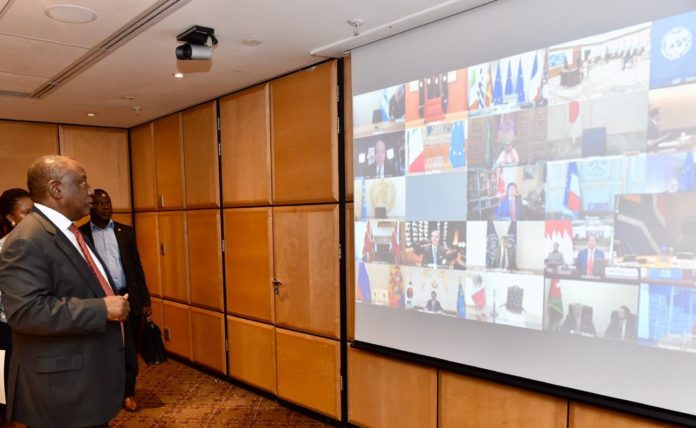By Winnie Kamau
South African President, Matamela Cyril Ramaphosa the current Chairperson of the African Union, convened a teleconference of the Bureau of the African Union Heads of State and Government.
In his opening remarks, President Ramaphosa emphasized on the importance of a continental coordinated response in order to arrest the rapid spread of the COVID-19 pandemic.
“The development and spread of the COVID-19 have stretched public health systems beyond limits and caused an enormous global economic, social and humanitarian meltdown,” said President Ramaphosa
“The fact that poverty, poor sanitation, an existing disease burden, overstretched health systems, and extreme urban population density mean that the pandemic could explode in an even more catastrophic way than has been seen thus far in Africa. Hence the need for urgent action in order to stem the tide” he added.
President Ramaphosa emphasized that the AU, Regional Economic
Communities (RECs) and all health institutions should direct their efforts at stopping the spread of the virus.
The Bureau received a briefing from Dr. John Nkengasong, the Director of the Africa Centres of Disease Control and Prevention (Africa CDC), who stated that the rapid spread of the COVID-19 is an unprecedented public health disaster.
Dr. Nkengasong stated, “The coronavirus has been spreading rapidly across the world, affecting 175 countries, with 470 000 confirmed cases and claiming more than 21,000 lives”.
So far 47 countries have reported cases with 5,255 positive cases 172 deaths and 371 recoveries. He warned that the pandemic could explode in poor countries in an even more catastrophic way than has been seen elsewhere thus far.
The Bureau expressed grave concern about the rising local infections, “We are concerned with the densely populated human settlements on the African continent hence the importance of coordination across the continent and the necessity to exchange credible and real-time information about the spread of the virus” said Dr. Nkengasong.
The Bureau agreed to establish a continental anti-COVID-19 Fund to which member states of the Bureau agreed to immediately contribute $12.5million as seed funding. African Union Member States, the international community and philanthropic entities are urged to contribute to this fund.
The Bureau noted the critical role of the Africa CDC and its under-funding this led to the Member States of the Bureau committing to contribute an amount of $4.5 million towards boosting the capacity of the Africa CDC.
The Bureau expressed concern about the possible shortages of medicines and vaccines as factories close or countries retain supplies for their own consumption.
The Bureau agreed on the vital importance of coordinating efforts to increase global production and improve the availability of medical products and equipment.
Given the limited health infrastructure in Africa and the reality that most of the pharmaceuticals and medical supplies consumed on the continent are imported, the Bureau called on the international community to encourage open trade corridors, especially for pharmaceuticals and other health supplies.
The Bureau urged the G20 to immediately provide African countries with medical equipment, testing kits, protective gear to combat the COVID-19 pandemic.
Additionally, the Bureau urged G20 countries to provide an effective economic stimulus package that includes relief and deferred payments. In this regard, the Bureau called for the waiver of all interest payments on bilateral and multilateral debt, and the possible extension of the waiver to the medium term, in order to provide immediate fiscal space and liquidity to governments.
The Bureau of the African Union Heads of State and Government chaired by
President Ramaphosa consists of Mali President Ibrahim Boubacar Keita, Kenya’s President Uhuru Kenyatta, Democratic Republic of Congo’s President Félix Tshisekedi, Egypt’s President Abdel Fattah el-Sisi, the Chairperson of the African Union Commission, Moussa Faki Mahamat, and
the Director of the Africa Centres of Disease Control and Prevention (Africa CDC), Dr. John Nkengasong,
The Bureau also urged the World Bank, International Monetary Fund, African Development Bank and other regional institutions to use all the instruments available in their arsenal to help mitigate against the scourge and provide relief to vital sectors of African economies and communities.














